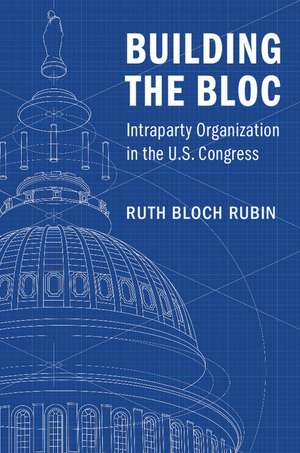Building the Bloc: Intraparty Organization in the US Congress
Autor Ruth Bloch Rubinen Limba Engleză Hardback – 10 aug 2017
Preț: 542.55 lei
Preț vechi: 727.89 lei
-25% Nou
Puncte Express: 814
Preț estimativ în valută:
103.87€ • 107.96$ • 86.12£
103.87€ • 107.96$ • 86.12£
Carte indisponibilă temporar
Doresc să fiu notificat când acest titlu va fi disponibil:
Se trimite...
Preluare comenzi: 021 569.72.76
Specificații
ISBN-13: 9781316510421
ISBN-10: 1316510425
Pagini: 332
Dimensiuni: 235 x 235 x 25 mm
Greutate: 0.64 kg
Editura: Cambridge University Press
Colecția Cambridge University Press
Locul publicării:New York, United States
ISBN-10: 1316510425
Pagini: 332
Dimensiuni: 235 x 235 x 25 mm
Greutate: 0.64 kg
Editura: Cambridge University Press
Colecția Cambridge University Press
Locul publicării:New York, United States
Cuprins
1. Intraparty organization in the US Congress; 2. Procedural revolt and the House insurgency, 1908–10; 3. The Senate insurgency's quest for economic reform, 1909–10; 4. Securing southern solidarity, 1937–56; 5. The decline of southern influence, 1957–64; 6. Making the moderates matter, 1994–2010; 7. Coordinating liberal hardliners, 1957–94; 8. Organizing conservative revolutionaries, 1970–2015; 9. Rethinking the mischiefs of faction.
Recenzii
'Congressionalists and scholars of American political development will hail this deeply researched study as a scholarly landmark. Writing confidently and vividly, Bloch Rubin demonstrates that, over time, the construction and maintenance of minoritarian blocs - in both houses - have fundamentally shaped the course of American history. Reading her path-breaking book will change how you think about Congress and its politically constitutive role in our regime.' Richard M. Valelly, Swarthmore College, Pennsylvania
'The emergence of an organized party faction in Congress often produces spectacular moments of high gamesmanship in which political careers are determined for better or worse. Behind those intra-party games is the painstaking labor of dedicated dissenters who create and manage those organized factions. Through her own painstaking research, Ruth Bloch Rubin has uncovered and analyzed their history, providing us with both a much deeper understanding of the genesis of political institutions and an illustration of how the eruption of factions has shaped and will continue to shape the trajectory of American politics.' Richard Bensel, Cornell University
'With analytical verve, historical depth, and empirical richness, this wonderful book illuminates the origins, character, and effects of organizations within parties on political representation in our national legislature. By deploying an institutional imagination with an eye for what matters, Building the Bloc compellingly shows how the persistence of these structures has shaped the character of legislative content and productivity, and sheds fresh light on key debates about parties, pivots, and preferences.' Ira Katznelson, Columbia University
'This deeply researched book offers a fresh perspective on congressional organization and policymaking. Ruth Bloch Rubin traces the development of the progressive Republicans of the early twentieth century, the Southern Bloc of the mid twentieth century, the Democratic Study Group of the 1960s and 1970s, as well as the Blue Dogs, the Republican Study Committee, and the Freedom Caucus of recent decades. In the process, she illustrates how intraparty organization empowers pivotal actors who drive policymaking and Congress's institutional development.' Frances E. Lee, University of Maryland
'The emergence of an organized party faction in Congress often produces spectacular moments of high gamesmanship in which political careers are determined for better or worse. Behind those intra-party games is the painstaking labor of dedicated dissenters who create and manage those organized factions. Through her own painstaking research, Ruth Bloch Rubin has uncovered and analyzed their history, providing us with both a much deeper understanding of the genesis of political institutions and an illustration of how the eruption of factions has shaped and will continue to shape the trajectory of American politics.' Richard Bensel, Cornell University
'With analytical verve, historical depth, and empirical richness, this wonderful book illuminates the origins, character, and effects of organizations within parties on political representation in our national legislature. By deploying an institutional imagination with an eye for what matters, Building the Bloc compellingly shows how the persistence of these structures has shaped the character of legislative content and productivity, and sheds fresh light on key debates about parties, pivots, and preferences.' Ira Katznelson, Columbia University
'This deeply researched book offers a fresh perspective on congressional organization and policymaking. Ruth Bloch Rubin traces the development of the progressive Republicans of the early twentieth century, the Southern Bloc of the mid twentieth century, the Democratic Study Group of the 1960s and 1970s, as well as the Blue Dogs, the Republican Study Committee, and the Freedom Caucus of recent decades. In the process, she illustrates how intraparty organization empowers pivotal actors who drive policymaking and Congress's institutional development.' Frances E. Lee, University of Maryland
Notă biografică
Descriere
When will dissident members of a Congress successfully seize power from their party leaders and fellow lawmakers? When they organize.
